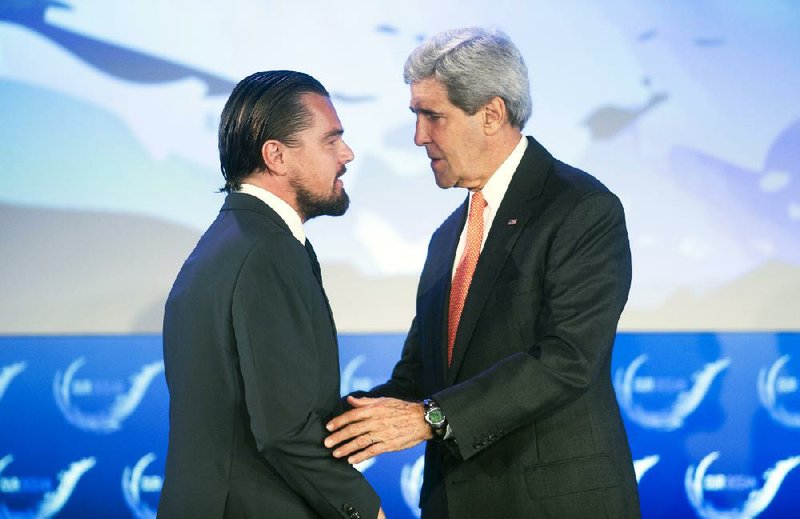WASHINGTON -- To protect diverse habitats of coral reefs, whales, dolphins, sharks, sea turtles and numerous fish species from commercial fishing and other activities, President Barack Obama announced Tuesday that he intends to use his executive authority to create the world's largest marine sanctuary in the central Pacific Ocean.
The move is one of the few ways in which the president can create new environmental protections without action from Congress. He also has used his executive authority under the Antiquities Act of 1906 to designate 11 new national monuments on land, ensuring that millions of acres of wilderness will remain untouched.
"Growing up in Hawaii, I learned early to appreciate the beauty and power of the ocean," Obama said at a White House event Tuesday. "And like Presidents Clinton and Bush before me, I'm going to use my authority as president to protect some of our most precious marine landscapes, just like we do for mountains and rivers and forests."
Presidents of both parties have used executive authority to protect public lands and waters. President George W. Bush created what was at the time the world's largest marine sanctuary, protecting 140,000 miles of water off the Hawaiian islands from commercial activity.
Bush's protections extend about 50 miles from the shore of the U.S. islands, but maritime law gives the U.S. control of up to 200 nautical miles from the coast, forming the outer limit of what Obama could protect using the Antiquities Act.
If Obama opts for the full 200 miles, conservation groups said, he could roughly double the amount of ocean that's protected worldwide.
A geographic analysis by the Pew Charitable Trusts estimated Obama could protect more than 780,000 square miles -- almost nine times what Bush set aside -- and far more if he included the waters around other U.S. islands in the Pacific Ocean.
Republican lawmakers have criticized Obama for using his executive authority to create monuments on land, thus blocking commercial activity such as oil and gas drilling. Experts said that commercial tuna fishing likely will be the only industry affected by the new sanctuary.
Rep. Doc Hastings, R-Wash., who is chairman of the House Natural Resources Committee, said in a statement, "Oceans, like our federal lands, are intended to be multiple-use and open for a wide range of economic activities that includes fishing, recreation, conservation and energy production. It appears this administration will use whatever authorities -- real or made-up -- to close our ocean and coastal areas with blatant disregard for possible economic consequences."
White House officials said they have not yet determined the borders of the new sanctuary, nor the specific statute under which it will be created. The officials said the White House will spend the next few months seeking input on the plan from outside groups, including environmentalists, the fishing industry and elected officials, before the plan is final.
Obama also is directing federal agencies to develop a comprehensive program aimed at deterring illegal fishing, addressing seafood fraud, and preventing illegally caught fish from entering the marketplace. Black market fishing constitutes up to 20 percent of the wild marine fish caught each year around the world.
The moves are part of a slate of actions that the White House and State Department are rolling out this week aimed at protecting the oceans. Secretary of State John Kerry, who hopes to make environmental protection a hallmark of his tenure, is spearheading the oceans initiative. This week, he is hosting an oceans conference at the State Department, focused on the threats to oceans posed by overfishing, pollution and climate change.
In his own keynote this morning, Kerry called for the creation of a global ocean strategy.
"Most people think the ocean is larger than life, an endless resource impossible to destroy. But people underestimate the enormous damage that we as humans are inflicting on the ocean every day," he said. "We run the risk of fundamentally breaking entire ecosystems."
In addition to praising the creation of the marine sanctuary, environmental groups also commended the administration's initiatives on illegal fishing.
A 2013 study conducted by the environmental group Oceana found that 33 percent of fish sold in metropolitan U.S. areas are mislabeled, with lower-cost, lower-quality fish often swapped out for higher-quality fish. For example, the study found that fish containing high levels of the toxic mercury, such as tilefish, are often mislabeled and sold as red snapper and halibut.
"From the amount of mislabeled seafood and illegal seafood products entering the U.S. markets, it's clear we need a comprehensive solution to ensure that seafood sold in the U.S. is safe, legally caught and honestly labeled," said Beth Lowell, a campaign director at Oceana.
Information for this article was contributed by Josh Lederman and Jonathan Fahey of The Associated Press.
A Section on 06/18/2014

